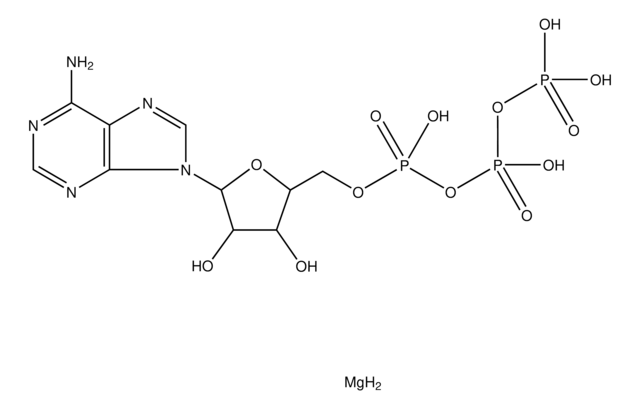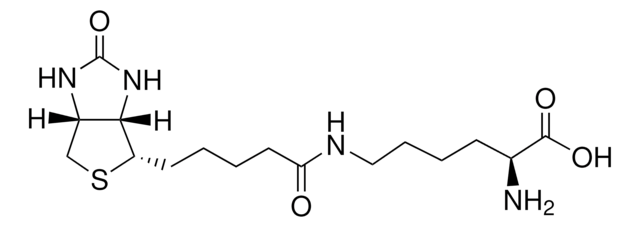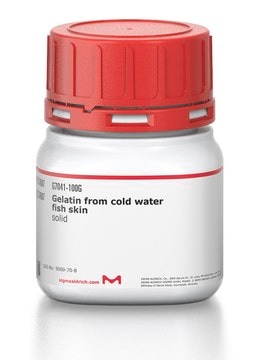M7273
Anti-Microtubule-Associated Proteins (MAPs) antibody produced in rabbit
whole antiserum
Faça loginpara ver os preços organizacionais e de contrato
About This Item
clone:
polyclonal
application:
WB
reatividade de espécies:
mammals
técnica(s):
western blot: 1:200
citations:
11
Produtos recomendados
fonte biológica
rabbit
Nível de qualidade
conjugado
unconjugated
forma do anticorpo
whole antiserum
tipo de produto de anticorpo
primary antibodies
clone
polyclonal
contém
15 mM sodium azide
reatividade de espécies
mammals
técnica(s)
western blot: 1:200
nº de adesão UniProt
Condições de expedição
dry ice
temperatura de armazenamento
−20°C
modificação pós-traducional do alvo
unmodified
Informações sobre genes
human ... MAP2(4133) , MAPT(4137)
mouse ... Mapt(17762) , Mtap2(17756)
rat ... Map2(25595) , Mapt(29477)
Descrição geral
Microtubule-associated protein 2 (MAP2) is a neuronal protein. It belongs to the MAP2/Tau family. This gene is located to human chromosome 2q34-q35. MAP2 is present in neurons. MAP2 is the major microtubule-associated protein of brain tissue. There are two major classes of heat stable MAPs; two are similarly sized with apparent molecular weights of 280kDa (MAP2a and MAP2b) and the third with a lower molecular weight of 70kDa (MAP2c).
Especificidade
Reacts with the two major classes of heat stable MAPs (MAP2 and τ). Does not react with MAP1 or tubulin.
Imunogênio
heat stable MAPs prepared from bovine brain.
Aplicação
Anti-Microtubule-Associated Proteins (MAPs) antibody produced in rabbit has been used in:
- immunofluorescent labelling
- immunohistochemistry
- immunoprecipitation
- immunofluorescence staining
- western blotting
Ações bioquímicas/fisiológicas
Microtubule-associated protein 2 (MAP2) interacts with microtubules to maintain the structure of dendrites. It plays a major role in supporting the actin cytoskeleton in spines, binding and nucleating filamentous actin (f-actin) to modulate spine morphology. Microtubules function as structural and mobility elements in mitosis, intracellular transport, flagellar movement and in the cytoskeleton.
Exoneração de responsabilidade
Unless otherwise stated in our catalog or other company documentation accompanying the product(s), our products are intended for research use only and are not to be used for any other purpose, which includes but is not limited to, unauthorized commercial uses, in vitro diagnostic uses, ex vivo or in vivo therapeutic uses or any type of consumption or application to humans or animals.
Não está encontrando o produto certo?
Experimente o nosso Ferramenta de seleção de produtos.
Código de classe de armazenamento
10 - Combustible liquids
Classe de risco de água (WGK)
WGK 3
Ponto de fulgor (°F)
Not applicable
Ponto de fulgor (°C)
Not applicable
Escolha uma das versões mais recentes:
Já possui este produto?
Encontre a documentação dos produtos que você adquiriu recentemente na biblioteca de documentos.
Dynamic Instability of Microtubules Assembled from Microtubule-Associated Protein-Free Tubulin: Neither Variability of Growth and Shortening Rates nor ?Rescue? Requires Microtubule-Associated Proteins
Billger MA, et al.
Biochemistry, 35(42), 13656-13663 (1996)
The MAP2/Tau family of microtubule-associated proteins
Dehmelt L, et al.
Genome Biology, 6(1), 1-10 (2005)
Increased Phosphorylation of Ca/Calmodulin-dependent Protein Kinase II and Its Endogenous Substrates in the Induction of Long Term Potentiation
Fukunaga K, et al.
Test, 270(11), 6119-6124 (1995)
Expression of multiple functional chemokine receptors and monocyte chemoattractant protein-1 in human neurons
Coughlan CM, et al.
Neuroscience, 97(3), 591-600 (2000)
J H Holstein et al.
British journal of pharmacology, 154(5), 1055-1062 (2008-05-06)
The immunosuppressive drug rapamycin (RAPA) prevents rejection in organ transplantation by inhibiting interleukin-2-stimulated T-cell division. Rapamycin has also been suggested to possess strong anti-angiogenic activities linked to a decrease in production of vascular endothelial growth factor (VEGF). Angiogenesis and VEGF
Nossa equipe de cientistas tem experiência em todas as áreas de pesquisa, incluindo Life Sciences, ciência de materiais, síntese química, cromatografia, química analítica e muitas outras.
Entre em contato com a assistência técnica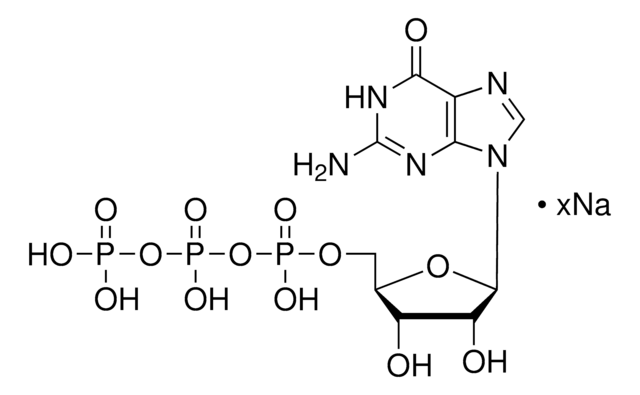


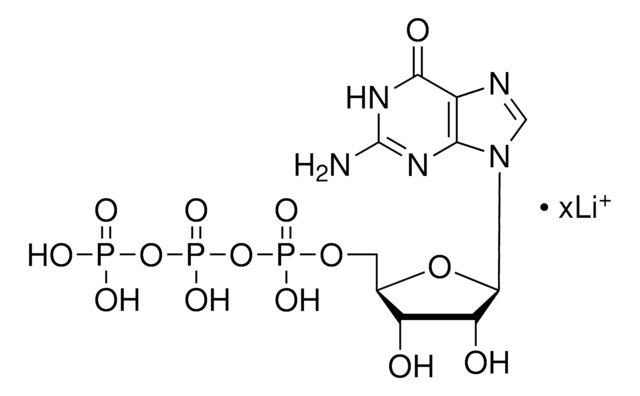

![Guanosine 5′-[γ-thio]triphosphate tetralithium salt ≥90% (contains < 10% GDP, HPLC), powder](/deepweb/assets/sigmaaldrich/product/structures/131/514/e3025b6a-cb52-4818-b20f-98efac485c1a/640/e3025b6a-cb52-4818-b20f-98efac485c1a.png)
